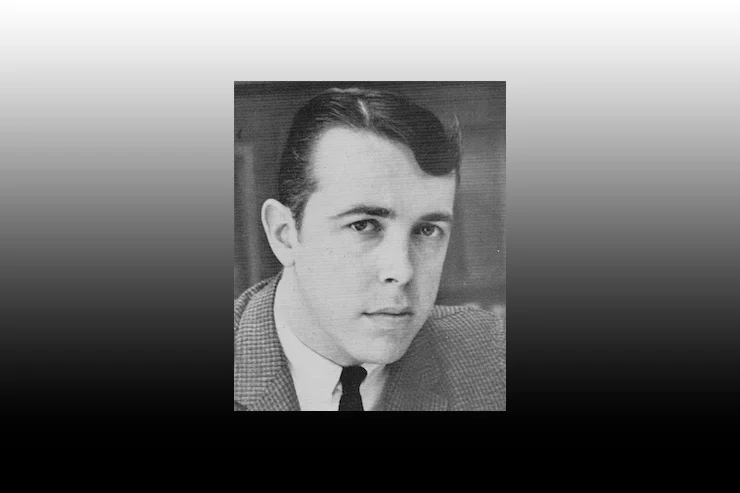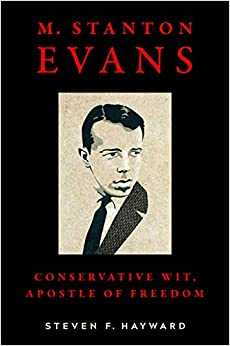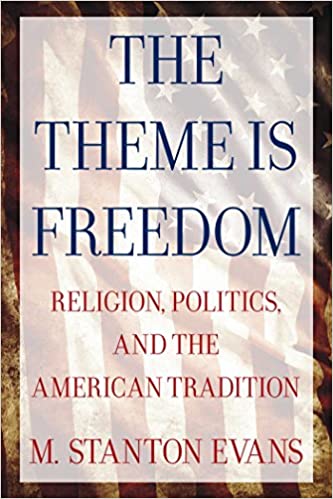Right From the Beginning: Remembering M. Stanton Evans
This essay originally appeared in the March 2023 issue of Chronicles as “Stan Evans: Unsung Hero of the Right” (here).

In his latest scholarly undertaking, itinerant academic, writer, and blogger Steven Hayward—author of an acclaimed two-volume biography of Ronald Reagan—turns his attention to an under-appreciated journalist and conservative thought leader, M. Stanton (“Stan”) Evans, who passed in 2015 at the age of 80. Despite his significant contributions to the post-WWII Right in America, Evans is not as well-known as his many accomplishments warrant. In M. Stanton Evans: Conservative Wit, Apostle of Freedom, Hayward ably endeavors to correct this oversight, chronicling Evans’ Zelig-like role in building the modern conservative political movement.
In the vein of sympathetic histories such as those produced by George Nash (The Conservative Intellectual Movement in America Since 1945) and Lee Edwards (The Conservative Revolution, Educating for Liberty), Hayward has produced an exhaustive—and unabashedly friendly–account of Evans’ estimable career.
Hayward is admirably thorough. He apparently read every book, article, column, book review, unsigned editorial, speech, lecture, and letter that Evans wrote; every debate transcript; every interview he ever gave; and every recorded remembrance of Evans by his many friends and colleagues. Evans was a prolific, gregarious, and well-liked man, and Hayward’s task in summarizing this vast body of material was daunting. Hayward’s prose is lively—and even witty when appropriate–complementing his subject’s sardonic sense of humor.

Evans was seemingly omnipresent in the 20th century conservative movement—helping to found The Party of the Right as an undergrad at Yale; upon graduation, serving in an editorial capacity for The Freeman, National Review, Human Events, and (for 15 years) the Indianapolis News; later, writing a nationally-syndicated column; founding the National Journalism Center in 1977; eventually heading both the American Conservative Union and the Philadelphia Society; and doing national radio commentary (in the pre-cable age). Evans also authored eight books, including The Theme Is Freedom (1994), Evans’ formulation of libertarian-traditionalist “fusionism” (a label he rejected, while embracing the concept), which was hailed by Samuel Francis as “a classic restatement” of the tradition of liberty.
Evans was not only present at the founding of Young Americans for Freedom in 1960, he wrote the group’s charter, the so-called Sharon Statement.
Under Evans’ leadership (1971-1977), the ACU undertook two notable projects of lasting importance. In 1974, the ACU began the now-annual Conservative Political Action Conference (CPAC), and in 1975 the ACU joined in a legal challenge to federal campaign finance restrictions that resulted in the landmark Supreme Court decision in Buckley v. Valeo. In addition, Evans was a mentor to many conservative writers (Hayward included), who began their careers as interns in Evans’ D.C.-based NJC. Among the 1,500 aspiring journalists who passed through the NJC under Evans’ tutelage are John Fund, Ann Coulter, Bill McGurn, Greg Gutfeld, and many others—NJC alumni collectively writing 40 books, and winning two Emmy awards and a Peabody.
Evans’ achievements are all the more remarkable because—unlike many center-right pundits today—he did not merely parrot GOP talking points and fashionable views congenial to the establishment. He was both prescient and independent. Fiercely anti-Communist, Evans was a defender of Sen. Joseph McCarthy (about whom he wrote a book, Blacklisted by History) and a resolute opponent of Henry Kissinger’s accommodationist China strategy; he was also an outspoken critic of President Richard Nixon, for both his foreign policy miscues and domestic policy perfidy. Conversely, Evans supported Barry Goldwater in 1964, Nixon’s now-forgotten Vice-President, Spiro Agnew, prior to his 1973 resignation, and Ronald Reagan (in 1976 and 1980), all despite substantial establishment resistance.
During the 1950s and 1960s—especially following the landslide defeat of Barry Goldwater in 1964—the conservative movement was moribund. It took tremendous fortitude to keep fighting (“without grief counselors,” Evans quipped), but Evans never relented. In the 1970s, when Evans arguably reached his peak influence as a journalist and conservative activist, the Republican Party was dominated by establishment figures such as Gerald Ford, Nelson Rockefeller, and Howard Baker—slim pickings, in other words. (Some things never change.) Despite these challenges, Evans never left the fray.
Evans was among a group of influential conservatives (the so-called “Manhattan Twelve”) dissatisfied enough with Nixon’s policies (particularly his China initiative) that in 1971 they threatened to oppose his re-election if his leftward drift continued. In typical fashion, Evans, ever the reliable conservative scribe, was tapped to draft the group’s formal statement. Evans was disenamored enough of Nixon to back Rep. John Ashbrook of Ohio in the 1972 GOP presidential primary. Conservative advocacy in the wake of Watergate was not for the faint-hearted. Evans’ disdain for GOP moderates led him (and others) to flirt with forming a conservative third party, which was obviated by the rise of Ronald Reagan (with Evans’ support, in the 1976 primary and otherwise).
Unlike some other “founders” of the modern conservative movement, Evans did not have a mid-life epiphany that turned him rightward; he never wavered in his views. Growing up in the south in a conservative household didn’t hurt. His outspoken father, Medford B. Evans (who had a Ph.D. from Yale and was on the original masthead of National Review), lost his faculty position at Northeast Louisiana State College and was passed over for an appointment to the board of the Hoover Institution, possibly due to his involvement in the John Birch Society. Evans dedicated The Theme Is Freedom to his father, “who kept the faith.” Evans’ political consciousness was further influenced at Yale by his exposure to Frank Chodorov, whom Evans credited with opening up “more intellectual perspectives to me than did the whole Yale curriculum.” After graduation, Evans briefly studied under Ludwig von Mises at NYU while working as Chodorov’s assistant editing The Freeman. Thereafter, Evans became a self-taught—albeit erudite—man of letters.
Evans was a pioneer. Today, we take the right-wing blogosphere for granted, as well as the constellation of Beltway think tanks, wonkish publications, and radio and cable TV pundits. National Review didn’t launch until 1955. When Evans graduated from college that year and embarked on his journalism career, Hayward reminds us, “there was no Heritage Foundation, no Cato Institute, no Media Research Center, no Washington Times, and the American Enterprise Institute was a tiny and largely unheard-from entity.” Anticipating the radicalization of college campuses, Evans recognized early-on the importance of resisting the Left’s capture of academia. In 1961, his first book, Revolt on the Campus, foreshadowed the emergence of “political correctness” and the “cancel culture.” Evans worked closely for many years with the Intercollegiate Studies Institute, speaking on college campuses.
Hayward describes Evans as “the perfect conservative,” one whom prominent movement conservatives felt “was always right on every issue.” Despite all of this, Evans has inexplicably fallen from the pantheon of key conservative thinkers. Sadly, Hayward laments, “Stan Evans is not well-known among the rising conservative generation,” a result partly due to Evans’ modesty and self-effacement. A graduate of Yale and an alumnus of the Yale Daily News, like William F. Buckley Jr. who preceded him, Evans was the antithesis of Buckley’s elitist (and self-promoting) persona. Evans was informal, down-to-earth, fun-loving, humble, and a fan of classic rock-and-roll (especially Elvis). The unassuming Evans drove, at various times, a VW bug, a Ford Mustang, and a “beat-up Chevy pickup truck.” Evans was unapologetically Old School: he avoided email, used a typewriter instead of a word processor, and smoked cigarettes.
Score-settling is not the aim of a tribute book such as MSE. Hayward is generally careful not to take sides in the various internecine battles Evans fought, including his feud with George Will. One anecdote, however, jumps off the page despite Hayward’s light touch. Even though Evans had been associated with National Review since 1959, when Evans published his 605-page, extensively-researched magnum opus, Blacklisted by History, in 2007 (blurbed by Ann Coulter as “The greatest book since the Bible”), the magazine (now under the direction of editor Rich Lowry) unaccountably assigned the review to a prickly antagonist who not only condemned the book but accused Evans (who had spent years doing archival research, leaving “no stone unturned,” in Hayward’s words) of plagiarism! A furious Evans understandably felt betrayed, as his father must have, too, when Buckley years earlier banished the John Birch Society from polite conservative circles. Buckley himself was a defender of McCarthy who had previously consulted with Evans for background material for one of Buckley’s last novels, The Redhunter (1999), which was based on McCarthy. No matter. National Review stabbed one of its longest-standing contributors in the back, rewarding Evans’ lifetime of service to the Right with scurrilous treachery.
Readers interested in 20th century politics and the development of conservative thought will find much useful information—and some inspiration–in MSE. Evans should be a role model for contemporary conservatives. He was principled and grounded, never losing his ideological bearings to Beltway Groupthink. He was combative without being cantankerous, erudite without being pretentious or sanctimonious, and ambitious without being self-important. Above all, he never lost his dry sense of humor. When diagnosed with terminal pancreatic cancer, Hayward reports that Evans’ “reaction was typically insouciant: ‘The good news is I no longer have to worry about my money holding out.’”
I commend Hayward’s fine book with one small nit: In his valiant effort to be comprehensive—even definitive–the book sometimes seems choppy, disjointed, and a bit repetitive. One hopes that similar tributes will be forthcoming for other “forgotten warriors” of the era, such as Ralph de Toledano, Ernest van den Haag, and Victor Lasky.
































